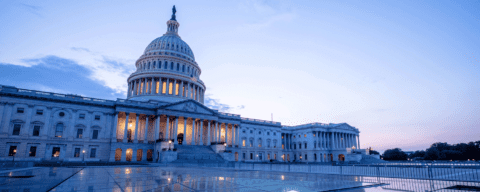After clearing the U.S. Senate and House last week, the Inflation Reduction Act of 2022 (IRA) was signed this afternoon by President Biden.
Background
The IRA passed on an exclusively party line vote with no Republicans in either chamber voting in the affirmative. The IRA is essentially a scaled down version of President Biden’s Build Back Better proposal, stripping the social spending provisions while retaining the climate, energy, and health care provisions at more modest levels. In addition, the proposal includes new taxes on large businesses, increased funding for the Internal Revenue Service, and small business incentives.
Not surprisingly, with legislation passed on a party line vote and with such broad reaching scope, reaction has widely varied. Business organizations such as the U.S. Chamber of Commerce and the National Manufacturers Association opposed it, while local leading companies like General Motors and Ford supported it on balance, given the inclusion of incentives for EVs. Additionally, the respected Coalition for a Responsible Federal Budget applauded the legislation for the revenue-raising elements, and many celebrated the elements targeting climate change.
The Detroit Regional Chamber did not take a position on the IRA, but has developed a breakdown of what this legislation could mean for the business community.
Electric Vehicles
The IRA directly seeks to increase electric vehicle (EV) production and adoption and pushes to get more American-made parts in those cars. Eliminating the numerical cap on consumer tax credits for EVs (currently at 200,000 per manufacturer), the bill restores the $7,500 credit for all manufacturers with no end date. It additionally adds a $4,000 credit for purchasing a used EV. To be qualified, the new EVs must meet the following qualifications:
- Sedans must have a MSRP of less than $55,000, trucks and SUVs must be less than $80,000, and used EVs cannot exceed a purchase price of $25,000.
- The purchaser cannot have an income of $150,000 or more. The limit is $300,000 for those filing a joint tax return.
- 40% of battery components must be sourced from the U.S. or other free trade agreement partners.
- Chinese components and materials must begin to be phased out in 2024.
- Batteries must be made in the U.S. by 2029.
MICHauto Perspective
 Federal EV tax credit extension will help support consumer transition to EVs, a top priority for auto manufacturers and state policy. Adding income caps is reasonable, and focusing the credits on moderately priced EVs will encourage more production in the heart of the market. Additionally, manufacturing EV batteries domestically will continue to create more jobs in Michigan and strengthen the resiliency of the OEM supply chain. Building that domestic supply chain, as well as significant material refining capacity, is the next big challenge for the industry.
Federal EV tax credit extension will help support consumer transition to EVs, a top priority for auto manufacturers and state policy. Adding income caps is reasonable, and focusing the credits on moderately priced EVs will encourage more production in the heart of the market. Additionally, manufacturing EV batteries domestically will continue to create more jobs in Michigan and strengthen the resiliency of the OEM supply chain. Building that domestic supply chain, as well as significant material refining capacity, is the next big challenge for the industry.
 The domestic materials requirements within the legislation create aggressive targets for onshoring supply chain and establishing partnerships for raw materials. If the industry cannot meet the sourcing requirements of this legislation, the benefits to consumers may be unattainable. Additional limitations within the legislation around MSRP and consumer income caps further limit the effectiveness and scope of these incentives for both the consumer and OEM.
The domestic materials requirements within the legislation create aggressive targets for onshoring supply chain and establishing partnerships for raw materials. If the industry cannot meet the sourcing requirements of this legislation, the benefits to consumers may be unattainable. Additional limitations within the legislation around MSRP and consumer income caps further limit the effectiveness and scope of these incentives for both the consumer and OEM.
MICHauto will continue to advocate for industry and public sector alignment to help scale up this supply chain as quickly as possible.
Clean Energy
With the goals of expanding clean energy efforts and reducing carbon emissions in the U.S., the IRA includes $60 billion for clean energy manufacturing, $30 billion in production tax credits for wind and solar, and credits for nuclear and carbon capture technologies. However, the IRA will impose a fee on excess methane emissions from oil and gas drilling. For consumers, there will be a 10-year consumer tax credit for investing in consumer-level renewable energy, such as solar panels and wind turbines.
Chamber Perspective
 Investing in grid resiliency is a Chamber priority. The IRA’s provisions can continue increased energy production while keeping consumer costs low. Many electric utilities have already begun the shift to cleaner energy and will be able to pass on these tax credits to consumers.
Investing in grid resiliency is a Chamber priority. The IRA’s provisions can continue increased energy production while keeping consumer costs low. Many electric utilities have already begun the shift to cleaner energy and will be able to pass on these tax credits to consumers.
Corporate Taxes
The IRA targets large corporations with a minimum tax rate of 15% to address many of the spending bills that Congress has passed. This rate will affect companies that have made $1 billion in revenue over the past three tax cycles.
Chamber Perspective
 Increasing the tax rate on any business, large or small, has detrimental economic impacts. When companies are forced to pay greater sums to the federal government, they cannot compete with foreign businesses regarding competitively priced products and labor. While it is important for all taxpayers to be treated fairly while also paying their fair share, tax increases deter investment, inhibit innovation, and undermine economic growth. During economic slowdowns, forcing businesses to redirect their income away from their employees, research, and investment will not lift the economy out of recession. Though there are provisions – such as clean energy initiatives and R&D investments – that will allow these corporations to pay less than 15%, targeting employers has a ripple effect in an uncertain future. The 15% minimum tax and increased IRS funding account for $300+ billion of deficit reduction included in the IRA.
Increasing the tax rate on any business, large or small, has detrimental economic impacts. When companies are forced to pay greater sums to the federal government, they cannot compete with foreign businesses regarding competitively priced products and labor. While it is important for all taxpayers to be treated fairly while also paying their fair share, tax increases deter investment, inhibit innovation, and undermine economic growth. During economic slowdowns, forcing businesses to redirect their income away from their employees, research, and investment will not lift the economy out of recession. Though there are provisions – such as clean energy initiatives and R&D investments – that will allow these corporations to pay less than 15%, targeting employers has a ripple effect in an uncertain future. The 15% minimum tax and increased IRS funding account for $300+ billion of deficit reduction included in the IRA.
Health Care
As signed, the IRA allows Medicare to negotiate drug prices, starting in 2026, for the top 10 drugs covered by its plan. Additionally, seniors on Medicare will have a $2,000 cap on out-of-pocket medical expenses as well as a $35 cap on monthly insulin refills. Lastly, those enrolling in health care via the healthcare.gov marketplace will have their premiums subsidized at the same rate as seen during the COVID-19 pandemic for three more years. Though health care coverage was a primary target in the original form of the IRA, negotiations within the Democratic caucus led to it mainly targeting government health care plans. It would be expected that broader changes to private health insurance will continue to be campaign promises for Democrats in the near future.
Chamber Perspective
 Employers and employees will remain greatly unaffected by the changes made to health insurance, with the right to negotiate coverages and the ability for employers to choose the plans that appropriately fit their employees remaining intact. The continued subsidization of health care premiums can be helpful for those smaller businesses that rely on this form of health care.
Employers and employees will remain greatly unaffected by the changes made to health insurance, with the right to negotiate coverages and the ability for employers to choose the plans that appropriately fit their employees remaining intact. The continued subsidization of health care premiums can be helpful for those smaller businesses that rely on this form of health care.
Small Business
While no part of this legislation targets small businesses specifically, employers should be aware of some provisions that may impact their businesses, especially regarding health care, EVs, R&D, and taxes.
Chamber Perspective
 First, because health care costs can be one of the most expensive employee-related expenses, the continued subsidization of Affordable Care Act plans will reduce out-of-pocket costs for employers, thus allowing saved money to be invested into other parts of company budgets. Additionally, this change will allow smaller businesses to compete with the health insurance plans of larger companies.
First, because health care costs can be one of the most expensive employee-related expenses, the continued subsidization of Affordable Care Act plans will reduce out-of-pocket costs for employers, thus allowing saved money to be invested into other parts of company budgets. Additionally, this change will allow smaller businesses to compete with the health insurance plans of larger companies.
Secondly, for businesses seeking clean energy options, swapping a fleet to electric vehicles will be more cost-effective and feasible with the new credits included in the bill. Between the EV credits and clean energy provisions, businesses will benefit from reduced energy costs.
Next, if small businesses have been taking advantage of the R&D tax credit, they will be able to double down during tax season. The credit is raised from $250,000 to $500,000, which can be applied against payroll taxes and various other expenses that were incurred during the R&D.
Additionally, the IRS is receiving an $80 billion investment. This additional funding will be used by the IRS to provide long overdue upgrades to outdated technology, which would allow for faster processing and increased staffing focused on high-income individuals and corporations. With an estimated $1 trillion in annual lost tax revenue due to tax evasion, the IRS will be able to recover more income and allow the federal government to continue funding essential small business programs.

